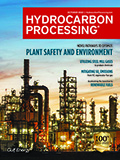
October 2022
Special Focus: Plant Safety and Environment
Industry faces significant challenges relating to the transition toward cleaner energy and more sustainable feedstocks.
Sulfur oxides removal has been a global trend in the refining and petrochemical industry.
Equipment malfunction or an unplanned shutdown of a SRU can have a significant effect on a production company’s profitability, along with an equally serious impact on personnel safety and the environment.
This article will consider how a system approach can help mitigate the risk of CUI and contribute to the performance and longevity of piping and equipment.
Biofuels, Alternative/Renewable Fuels
The global push to neutralize carbon-based GHG emissions by 2050 not only holds great promise for the future of the planet, but it also stands to create millions of jobs, spur rapid growth and drive technological innovation.
The use of biodiesel is rapidly becoming more popular due to growing trends both inside and outside the petroleum industry.
Catalysts
The world has experienced profound changes throughout the global disruption created by the COVID-19 pandemic.
Hydrocarbon Processing Awards 2022
<em>Hydrocarbon Processing</em>, the downstream processing sector’s leading technical publication for 100 yr, has announced the finalists for its sixth annual <em>HP</em> Awards, which celebrate innovative technologies and people that have been instrumental in improving facility operations over the past year.
Maintenance and Reliability
Most industrial assets operating at elevated temperatures require thermal insulation for energy conservation, thermal protection or process stabilization.
Multiple defects were found in pressure swing adsorption (PSA) vessels during an outage of one of four PSA process units.
Heat Transfer
Determining whether or not to operate an air-cooled heat exchanger (ACHE) under natural convection is a challenge due to the limited information available for simulations of an ACHE under operation without fans.
Digital Technologies
Process manufacturers are investing significant resources in machine-learning (ML) to increase reliability, profitability and sustainability in their operations—saving millions of dollars in short periods of time through increased efficiency.
For the foreseeable future, our global economy will continue to rely on fossil fuels as our primary energy source. Because this affects every aspect of the supply chain, the oil and gas sector will continue to be a target for cyber attacks from state and non-state actors that are looking to cripple infrastructure, hold systems for ransom or infiltrate to gain access to new technologies.
Columns
Since the mid-2010s, <em>Hydrocarbon Processing</em> has recognized the top refining and petrochemical projects of the year.
Industrial facilities with cooling towers in the U.S. must meet U. S. Environmental Protection Agency (EPA) and local wastewater requirements for effluent, including those under the Clean Water Act.
Trends and Resources
On October 12, <em>Hydrocarbon Processing</em> will be announcing the winners of the 2022 <em>HP</em> Awards.
For years, lubricating greases and motor oils have been manufactured from base oils.
AW-Lake now offers a new Portable Transit Time Ultrasonic Flow Meter in addition to the full-sized clamp-on version that provides non-contacting flow measurement for the most challenging industrial environments with minimal installation complexity and costs.

- SkyNRG starts construction on its first SAF plant in Delfzijl, the Netherlands 2/13
- India's Reliance wins U.S. license for Venezuelan oil 2/13
- Singapore light distillates stocks hit over 3-yr high on robust imports 2/13
- Three contractors injured at ExxonMobil facility in Beaumont, Texas (U.S.) 2/13
- China's epic renewables boom lifts it into rare clean capacity club 2/13
- TotalEnergies booked loss in France due to refining activities, CEO says 2/13




